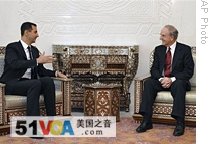State Department
24 June 2009
The Obama administration confirms it is sending a U.S. ambassador to Syria after a four-year absence. The last U.S. ambassador in Damascus was withdrawn in 2005 after the Beirut assassination of former Lebanese Prime Minister Rafik Hariri.
 |
| U.S. Mideast envoy George Mitchell (r) meets with with Syrian President Bashar al-Assad at the Syrian presidential palace, in Damascus, 13 Jun 2009 (photo released by the Syrian official news agency SANA) |
State Department Spokesman Ian Kelly said the decision was conveyed on Tuesday to the Syrian government.
He said the administration continues to have concerns about aspects of Syrian behavior, but believes U.S. interests can best be advanced by a fully-normal relationship with Damascus.
"Yesterday we informed the Syrian charge d'affaires in Washington and our charge d'affaires in Damascus informed the ministry of foreign affairs in Damascus of the administration's decision to return an ambassador to Syria," Kelly said. "This decision reflects the administration's recognition of the important role Syria plays in the region. And of course we hope they will continue to play such a constructive role to promote peace and stability in the region."
The United States has been critical of Damascus for, among other things, supporting regional extremists and facilitating the transit of would-be terrorists through its territory to Iraq.
But senior U.S. officials, including American military commanders in Iraq, have in recent months credited Syria with better border controls that have reduced the extremist traffic to a relative trickle.
After an initial State Department visit by Syria's chief diplomat in Washington in February, the administration twice dispatched Assistant Secretary of State for Near Eastern Affairs Jeffrey Feltman and White House National Security Council Middle East chief Daniel Shapiro to Damascus for exploratory talks.
A U.S. military team went there late last month to discuss the stabilization of Iraq. And U.S. Middle East envoy George Mitchell met with Syrian President Bashar al-Assad in Damascus two weeks ago for what Mitchell said were serious and productive discussions.
Mitchell has stressed that his objective is not just an Israeli-Palestinian peace accord but a broader Middle East settlement that includes peace between Israel and Syria.
Spokesman Kelly gave no time frame for the arrival of a new U.S. envoy in Syria, who would have to be nominated by the White House and approved by the Senate.
Margaret Scobey, the previous U.S. envoy to Syria, is now the American ambassador to Egypt.
She was withdrawn in 2005 after the car-bomb assassination of former Lebanese Prime Minister Rafik Hariri, in which Syrian officials were implicated by investigators. Syria denies involvement.
Syria continues to be listed by the State Department as a state sponsor of terrorism.